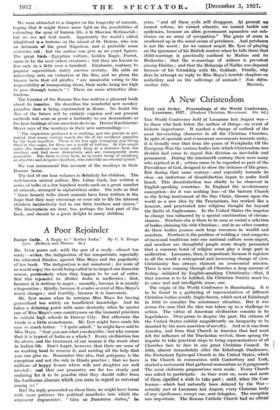A Poor Rejoinder
Father India. A Reply to " Mother India." By C. S. Range Iyer. (Selwyn and Blount. 6s.) Me. IYEU pours out, with the pen of a ready—almost too ready—writer, the indignatiOn of his compatriots, especially the educated Hindus, against Miss Mayo and the popularity of her book. The indignation is not unnatural ; for none of us would enjoy the world being called in to inspect our domestic- sewers, particularly when they happen to be out of. order. But this rejoinder to Mother India is ineffective ; first, because it is written in anger ; secondly, because it is mainly vituperative ; thirdly, because it evades several of Miss Mayo's worst charges ; and fourthly, because it is inaccurate.
Mi. Iyer scores when he arraigns Miss Mayo for having generalized too widely on insufficient knowledge. And he takes a debating point with some dexterity when he quotes one of Miss Mayo's own countrymen on the immoral practices in certain high schools in Denver City. But otherwise the tirade is a little monotonous. Mr. Iyer might have made his case so much better. " I quite admit," he might have said to Miss_ ayo, "that you saw what you describe.; but why assume that it is typical of India as a whole ? Every- civilization has its ulcers, and the treatment of our women is the worst ulcer, in Indian life. Don't forget, howeier, that there are some of us working haul to remove it, and needing all the help that you can give us. Remember this also, that polygamy is the exception and not the rule in Hindu practice ; that we have millions of happy homes where wife and daughter are well treated ; and that our peasantry are far too sturdy and enduring for it to be possible that they should suffer from the loathsome diseases which you seem to regard as universal- among us."
Had the reply proceeded on those lines, we might have borne with more patience the political manifesto into which the • argument degenerates. " Give . us Dominion status." he cries, " and all these evils svill disappear. 4t present we cannot reform, we cannot educate, we cannot tackle our epidemics, because an alien. government squanders our sub- stance on an army of occupation." The grain of sense is swallowed up in the usual ocean of petulance. And petulance
• is not the worst ; for we cannot 'acquit Mr. Iyer of playing on the ignorance of his British readers when he tells them that child-marriage is practically confined to Madras and its Brahmins ; that the re-marriage of widows is prevalent among Hindus ; and that the Maharaja of Nabha was deposed because of his friendship with Mr. Gokhale. Finally, why does he attempt no reply to Miss Mayo's terrible chapters on midwifery and on the sufferings of animals ? Non defen-










































































 Previous page
Previous page